I’m excited that my free eBook – 5 Things You’re Not Doing to Connect to Down There and Tips to Easily Make the Trip Downtown is available for your down there pleasure and awareness. It’s hot of the press! Please take a minute to get your copy on my home page of inspiredtohealth.net.
There’s two new reports related to fertility that came out recently that you won’t find mentioned in detail in my book, but it’s important enough to share in this blog post.
Both reports involve what you ingest to your lovely amazing beautiful body. The news is especially important to a woman’s reproductive and overall health.
1) Avoid drinking soda or sugary drinks! Sugar isn’t good for your fertility
If you’re drinking one glass of a sugary drink a day (8 ounces) it’s linked to lowering your fertility if you’re a man or a woman. Swigging a cup of soda or other sugar filled drink just doesn’t increase your risk of type 2 diabetes, obesity, and inflammation, but it affects your health down there. For men, it weakens your sperm quality – your swimmers are less perky and for young girls it’s associated with early menstruation.
Here’s what the study found:
“Women who drank at least one soda per day demonstrated a 25 percent lower monthly probability of conception, while men who drank at least one soda per day had a 33 percent lower probability of successfully conceiving with their partner.”
Don’t let those heartwarming sugary drink commercials or just because your friends are doing it put you on a path to fertility and other health problems. Going to doctors, lots of annoying tests and costly treatments won’t leave a good taste in your mouth.
Just put the sugary drink down and walk away.
You can’t go wrong with chugging water.
2) Your body can’t process Vitamin D if you don’t have enough magnesium
Let’s say you’re taking a high-quality Vitamin D supplement and you’re low in magnesium. The Vitamin D stays inactive and stored in your system.
New research indicates that this is impacting 50 percent of Americans and it can be dangerous.
It’s important to know that if you’re low in magnesium, you can still be low in Vitamin D, but it can increase your calcium deposits and phosphate levels that could lead to what’s called vascular calcification – deposits of calcium into blood vessel structures. Not good!
Optimal magnesium levels allow for less Vitamin D supplementation. If you’re taking Vitamin D to avoid osteoporosis, magnesium also helps reduce the risk of bone fracture.
For ladies, Vitamin D is important to the health of ovarian cells and for lymphatic drainage. What’s not good for your magnesium levels is stress because it depletes your levels while making the stress hormone, cortisol.
Here are a few signs of low magnesium:
- Loss of appetite
- Fatigue
- Increased muscle contractions and cramping; remember your uterus and painful cramps might be signal from your body to boost your magnesium
- Fallopian tube spasms that make it harder for the embryo to travel to the womb for implantation
- Higher cortisol levels (stress hormone)
- Increases risk of a miscarriage, premature labor, a health challenges of baby
You can bam up your supplies of magnesium by eating foods rich in magnesium and a high-quality supplement.
Examples of Foods High in Magnesium
- Almonds
- Broccoli
- Bananas
- Beans
- Brown Rice
- Figs
- Fish Oil
- Green Vegetables
- Seeds (pumpkin, sesame, black sesame)
The good news is that being aware of the possible negative impact of drinking sugary drinks on your fertility and focusing on getting enough magnesium are about making choices to support your health. It’s doable. It’s low hanging fruit to take advantage of.





